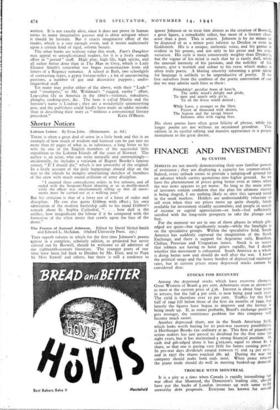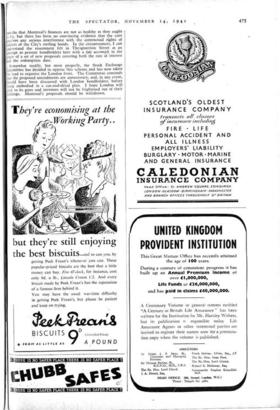FINANCE AND INVESTMENT
By CUSTOS
MARKETS are not merely demonstrating their now familiar powers of resistance ; they are displaying a capacity for counter-attack. Indeed, every setback seems to provide a jumping-off ground for an advance which carries quotations into higher ground. So we have the phenomenon of prices going better even at times when the war news appears to get worse. So long as the main army of investors remain confident that the plan for ultimate victory is being shaped, I see nothing likely to alter this upward trend in the stock markets. Holders are understandably reluctant to sell even when they see prices move up quite sharply, funds available for investment steadily accumulate, and people in search of income or capital appreciation—or both—feel sufficiently satisfied with the long-term prospects to take the plunge and buy. For the moment we are in one of those phases in, which gilt- edged are quiet—but significantly steady—while the limelight is on the speculative groups. Within the speculative field, South America has suddenly captured the imagination of the Stock Exchange, and there is support for Argentine rails, Brazilian, Chilian, Peruvian and Uruguayan issues. Stock is so scarce that jobbers are having to hoist prices rapidly, but I doubt whether this movement is exhausted. South America as a whole is doing better now and should do well after the war. -I know the political snags and the heavy burden of depreciated exchange rates, but at current prices many depressed stocks cannot be considered dear.
STOCKS FOR RECOVERY
Among the depressed stocks which have recovery chances, Great Western of Brazil 4 per cent. debentures seem as attractive as most at the current price of £36. Interest is about four years in arrears, but the full 4 per cent, is now being paid each year. The yield is therefore over to per cent. Traffics for the first half of 1941 fell below those of the first six months of 1940, but latterly the figures have begun to improve and the leeway is being made up. If, as seems probable, Brazil's exchange position gets stronger, the remittance problem for this company will become much easier. Another depressed share, not in the South American field, which looks worth buying for its post-war recovery possibilities, is Herrburger Brooks 15s. ordinary at 9s. This firm of pianoforte action makers has just passed its dividend for the first time for eight years, but it has maintained a strong financial position. In cash and gilt-edged alone it has £103,000, equal to about 8s. a share, so that one is paying very little for future earning power. In pre-war days dividends ranged between 7/ and 14 per cent., and in 1937 the shares touched 28s. 9d. During the war the company should make both ends meet. When peace returns the piano trade should do well in meeting banked-up demand.
TROUBLE WITH MONTREAL
It is a pity at a time when Canada is rapidly intensifying her war effort that Montreal,, the Dominion's leading city, should have put the backs of London investors up with some really unworthy debt proposals. Everyone has known for several Lionths that Montreal's finances are not as healthy as they ought ID he, but there has been no convincing evidence that the cure involves any serious interference with the contractual rights of holders of the City's sterling bonds. In the circumstances, I can understand the resentment felt in Throgmorton Street at an atempt to present bondholders here with a fait accompli in the hope of a set of new proposals covering both the rate of interest ind the redemption date.
Somewhat tardily, but most properly, the Stock Exchange Committee has decided to oppose this scheme and has' now taken he lead to organise the London front. The Committee contends that the proposed amendments are unnecessary, and, in any event, should have been discussed with London bondholders before being embodied in a cut-and-dried plan. I hope London will stick to its guns and investors will not be frightened out of their holdings. Montreal's proposals should be withdrawn.























 Previous page
Previous page